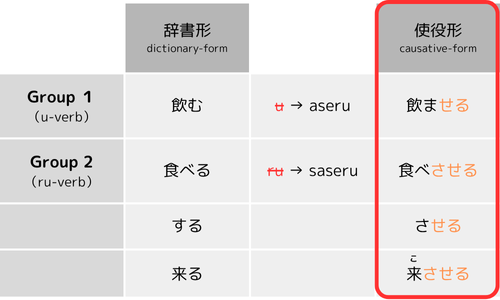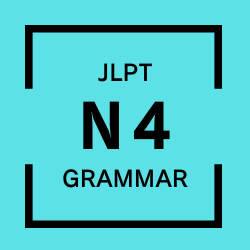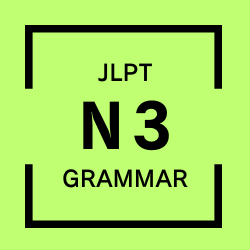例文
①【強制】
彼は嫌がる女性に無理矢理お酒を飲ませた。
He forced a woman who didn't want to drink to drink.
②【説得】
母は、後でお小遣いをあげるからといって、息子をお使いに行かせた。
My mother got her son to go on an errand, saying that she would give him an allowance later.
③【指示】
その上司は、部下に契約書を作らせた。
The supervisor had his subordinate draw up the contract.
④【許可・許容】
その国は、ワクチン接種が終わっている人だけを入国させた。
The country allowed only those who had already been vaccinated to enter the country.
⑤【放任・放置】
息子が、言うことを聞かないので好きなようにさせた。
My son did not listen to me, so I let him do what he wanted.
⑥【原因】
彼の病院嫌いが、病気の発見を遅らせた。
His dislike of hospitals delayed the discovery of his disease.
⑦【責任】
彼は医療ミスで患者を死なせてしまった。
He made a medical error that resulted in the death of a patient.
意味・用法
ある人の行為や動作が、使役者(=主語)の何らかの影響力の行使により行われたと言いたい場合に使われます。どんな影響力を行使してそうさせたかは文脈によって変わります。用法の分類の仕方には色々なものがありますが、「強制・説得・指示・許可/許容・放置/放任・原因・責任」などの色々な意味で使われます。
英語 force, make, get, have, allow, send, etc.
The causative form is used when the subject (the causer) exerts influence to make someone or something else (the causee) perform an action. The type of influence exerted varies depending on the context — it may involve coercion, persuasion, instruction, or other forms of encouragement or pressure.
詳しい文法解説 grammar point
▷ 使われ方
使役形は、主語となる人や物(=使役者)が影響力を行使して、動作主(=被使役者)にその行為を行わせると言いたいときに使われます。
1. 弟はアイスを買った。
My younger brother bought some ice cream.
[動作主(=主語):弟]
2. 私は弟にアイスを買わせた。
I made my younger brother buy some ice cream.
[使役者(=主語):私]
[被使役者:弟]
▷ 用法の分類
主語(使役者)がどのような影響力を行使してそうさせたかは文脈によって様々であり、強制してそうさせた場合や説得してそうさせた場合、指示をしてそうさせた場合など色々あります。
強制
3. 彼は私を無理やり働かせた。
He forced me to work.
説得
4. 彼は、あとでご飯をおごるからといって、友達に引っ越しを手伝わせた。
He got his friend to help him move by saying he'd buy him a meal later.
指示
5. 上司は部下に書類を取りに行かせた。
The boss had his subordinate go and get the documents.
※「親→子/上司→部下」のような目上から目下に対しての関係で使われる。
許容使役(妨げない使役)
主語(=使役者)がそれを止めたり、妨げたりする影響力をもちながら、それを止めなかったことでその事象が起こった場合にも使役形が使われます。
許可・許容
6. その旅館のオーナーは、お金のない人でも宿に泊まらせた。
The inn's owner allowed even those without money to stay.
放任・放置
7. 両親はお年玉の使い道を、彼の好きにさせた。
His parents let him decide how to use his New Year's gift money.
8. 彼はお風呂の水を溢れさせた。
He let the bathtub overflow.
非意図的な使役
主語(使役者)が、意図せずにある行為や現象を起こらせた場合にも使役形が使われます。この非意図的な使役は、無生物が主語(使役者)になることもできます。
また、主語がそれが起きたことに責任を感じていることを表したいときには使役形が使われます。この用法は、実際には主語が何のの影響力を与えていない場合でも使われます。
原因
9. その災害が人々の生活を一変させた。
The owner of the inn allowed even those without money to stay.
原因(感情誘発)
10. その彼の不用意な一言が彼女を怒らせた。
His careless remark made her angry.
責任
11. 私は娘を病気で死なせてしまった。
I let my daughter die from illness.
12. 待たせてしまい、申し訳ありません。
I'm sorry for making you wait.
※責任の用法は「しまう」と一緒になった「させてしまう」の形もよく使われる。
その他
主語(使役者)が、被使役者が自分一人でできない行為のサポートをしているといった意味でも使われます。
サポート
13. 私一人で家族5人を食べさせている。
I'm supporting my family of five all by myself.
14. 赤ちゃんにそろそろミルクを飲ませる時間だ。
It's about time to feed the baby some milk.
▷ 助詞の使い方①:他動詞の場合
被使役主の後ろは、「に」を使います
15. 彼は私にアイスを買わせた。〇
彼は私をアイスを買わせた。✖
He made me buy ice cream.
▷ 助詞の使い方②:自動詞の場合
被使役主の後ろには、「に」か「を」を使います。「に」は被使役主の意志に基づいてそうさせた場合に使われる傾向があり、「を」は被使役主の意志に反してそうさせた場合に使われる傾向があります。
また、被使役主の非意志的な行為の場合は「を」が使われます。したがって、被使役主が無生物の場合も「を」のみを使います。
16. 彼は息子に/を座らせた。〇
He had his son sit down.
被使役者の非意志的行為
17. 先生はみんなを笑わせた。○
先生はみんなに笑わせた。✖
The teacher made everyone laugh.
*「笑う、泣く、驚く」のような感情を表す言葉は非意図的な行為。
使役者が無生物
18. 失敗がプロジェクトを終わらせた。〇
失敗がプロジェクトに終わらせた。✖
The failure caused the project to be terminated.
▷ 備考:~す/さす(使役)
同じ使役を表すために「~す/さす」という言い方もあります。元々は関西方言を中心に使われていましたたが、現代では共通語で使われることがあります。ただし「~せる/させる」に比べ「~す/さす」は口語的な響きがあります。
19. 私を彼を買い物に行かすことにした。
=行かせる
I decided to have him go shopping.
20. 赤ん坊を寝さすのに苦労した。
=寝させる
It was hard to get the baby to sleep.
接続 formation

また、使役形自身もGroup2の動詞と同じように活用します。
| 使役形 | 飲ませる | 着させる |
| +ます | 飲ませます | 着させます |
| +ない | 飲ませない | 着させない |
| +ば | 飲ませれば | 着させれば |
| +う(意向) | 飲ませよう | 着させよう |
| +た | 飲ませた | 着させた |
| +て | 飲ませて | 着させて |
関連文法 related grammar

~れる/られる(受身形)
- JLPT N4 Grammar

~させられる(使役受身)
- JLPT N3 Grammar
例文 example sentences
用法①:強制
・その上司は嫌がる部下に無理やりお酒を飲ませた。
That boss forced his subordinate, who did not want to, to drink alcohol.
・その先生は騒ぐ生徒たちを暴力を使って黙らせた。
The teacher silenced the noisy students using violence.
・その親は子供に毎日3時間もピアノの練習をさせた。
The parent had their child practice the piano for three hours every day.
用法②:説得
・彼女は「こっちの服の方が似合うよ」と言って、私に服を着替えさせた。
She said, "You look better in this dress," and had me change my clothes.
・彼は「今度ご飯をおごるから」と言って、私に引っ越しを手伝わせた。
He said, "I'll buy you dinner sometime," and had me help him move.
・「あなたのレベルでは受からない」と、先生たちはその学生にJLPTN1の受験をあきらめさせた。
The teachers had the student give up taking the JLPT N1, saying, "You won't get in at your level."
用法③:指示
・上司は部下にコピーを取らせた。
The boss got the subordinate to make some copies.
・先生は生徒達に手を挙げさせた。
The teacher had the students raise their hands.
用法④:許可・許容
・子供達に空いてる教室を自由に使わせた。
They allowed the children to use the vacant classroom as they liked.
・警察は逮捕する前に犯人に1本だけタバコを吸わせた。
The police let the suspect smoke one cigarette before arresting him.
用法⑤:放置・放任
・買い物に行っている間、子供を一人で遊ばせておいた。
I left my child to play alone while I went shopping.
用法⑥:原因
・大量の雨が河川を氾濫させた。
The heavy rain caused the river to flood.
・彼の言葉遣いは、私をイライラさせた。
The way he talked irritated me.
用法⑦:責任
・彼に嫌な思いをさせてしまった。
I made him feel bad.
・恥をかかせてしまい、申し訳ない。
I'm sorry for making you feel embarrassed.
用法①:強制
・その上司は嫌がる部下に無理やりお酒を飲ませた。
That boss forced his subordinate, who did not want to, to drink alcohol.
・その先生は騒ぐ生徒たちを暴力を使って黙らせた。
The teacher silenced the noisy students using violence.
・その親は子供に毎日3時間もピアノの練習をさせた。
The parent had their child practice the piano for three hours every day.
用法②:説得
・彼女は「こっちの服の方が似合うよ」と言って、私に服を着替えさせた。
She said, "You look better in this dress," and had me change my clothes.
・彼は「今度ご飯をおごるから」と言って、私に引っ越しを手伝わせた。
He said, "I'll buy you dinner sometime," and had me help him move.
・「あなたのレベルでは受からない」と、先生たちはその学生にJLPTN1の受験をあきらめさせた。
The teachers had the student give up taking the JLPT N1, saying, "You won't get in at your level."
用法③:指示
・上司は部下にコピーを取らせた。
The boss got the subordinate to make some copies.
・先生は生徒達に手を挙げさせた。
The teacher had the students raise their hands.
用法④:許可・許容
・子供達に空いてる教室を自由に使わせた。
They allowed the children to use the vacant classroom as they liked.
・警察は逮捕する前に犯人に1本だけタバコを吸わせた。
The police let the suspect smoke one cigarette before arresting him.
用法⑤:放置・放任
・買い物に行っている間、子供を一人で遊ばせておいた。
I left my child to play alone while I went shopping.
用法⑥:原因
・大量の雨が河川を氾濫させた。
The heavy rain caused the river to flood.
・彼の言葉遣いは、私をイライラさせた。
The way he talked irritated me.
用法⑦:責任
・彼に嫌な思いをさせてしまった。
I made him feel bad.
・恥をかかせてしまい、申し訳ない。
I'm sorry for making you feel embarrassed.
<参考文献>
高見健一『受身と使役 その意味規則を探る』

If you have any questions about this grammar, please comment below.
